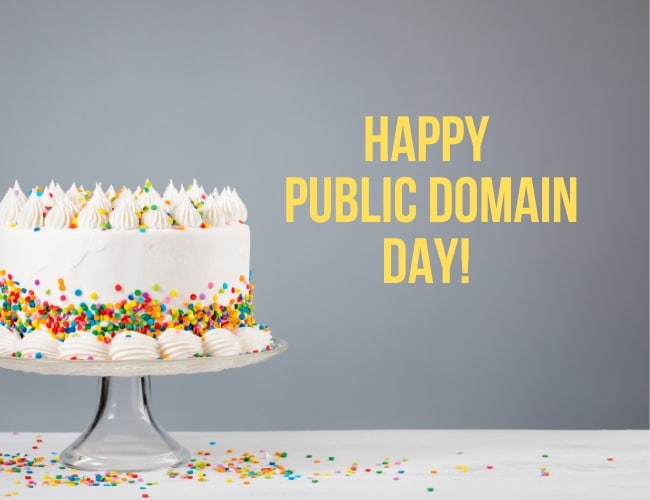You may have seen posts across social media on January 1, 2024 celebrating Public Domain Day with pictures of Disney's Steamboat Willie Mickey Mouse animation. What is Public Domain Day and how does it affect writers?

Public Domain Day was on January 1st, but it is not too late to celebrate. But what exactly is public domain?
Public domain is a term used to describe creative works that are no longer protected by copyright protection and are freely available for use by the public. This includes books, films, music, art, and other forms of creative expression. Once a work enters the public domain, anyone can use it without obtaining permission from the original creator.
Why does Public Domain Day matter?
Each year, new works enter the public domain, which means that they are available for anyone to use as is, alter, sell, etc. Copyright no longer protects them.
While we’re on the topic, what is the purpose of copyright laws in the US?
According to the U.S. Constitution, Congress has the power “To promote the Progress of Science and useful Arts, by securing for limited Times to Authors and Inventors the exclusive Right to their respective Writings and Discoveries.”
What does that mean?
By protecting intellectual property against unauthorized use (theft) for “limited Times,” the Founders intended to encourage advancement in Science and the Arts because creators would benefit from their labor. Since the exclusivity is for a limited itme, eventually these works become “common property.”
The laws currently in place make all works produced in 1928 and earlier in the public domain, i.e., they make them everyone’s property. Some later works are also in the public domain, but be certain to check before using them in your work.
For most purposes, copyright protection for works created after 1978 lasts the life of the author plus an additional 70 years. So if you write a bestselling series this year, you (or your publisher) will own the copyright to it for the rest of your life, and your estate can continue to protect the copyright an additional 70 years.
Note: creators, companies, and organizations can file to renew copyright protection, in which case the work would have continued copyright protections. If you are in doubt about a work's public domain status, you can look it up at the U.S. Copyright Office. (Obviously for our international readers, your own country and regional laws apply.)
Why is 2024 significant?
Two icons of popular culture entered the public domain this year.
Steamboat Willie, a 1928 Disney film, and with it the early version of Mickey Mouse, is no longer under copyright. Note, however, that only this version of Mickey Mouse is in the public domain, and it is a leaner, meaner mouse.
Later versions of Mickey Mouse remain under separate copyright, and even the Steamboat Willie version is trademarked, which means you can’t use it in a way that makes people think you are connected to Disney.
The other icon is Tigger from Winnie the Pooh. Pooh entered the public domain earlier, but Tigger first appeared in 1928, so this year he becomes free. (Pun intended.)
Many other well-known works entered the public domain this year. Here is a link to an update by Kathryn Goldman of the Creative Law Center about “What is in the Public Domain?”
For most of us, the change will not make a significant difference, but at least you no longer need to worry about a lawsuit for putting those early versions of Mickey or Tigger in your works.
Why does copyright law and public domain matter for writers?
There are at least two big reasons that copyright law matters for writers.
1. We want our own work protected. If I write a bestselling novel, I don't want someone else to copy and paste my manuscript inside their own cover and sell it for profit, robbing me of my sales for all my hard work. Copyright means I (or more likely my publisher) can sue to protect the work.
2. As writers, we don't want to BE sued for inadvertently (or purposefully!) using copyrighted work. It's worth checking whether or not a book, film, trademark, song, or other creative work is in the public domain, or if you need permission to use it. This is why most spin-off fan fiction can only exist on free websites. You cannot profit from the work and stay out of legal trouble.
Happy Public Domain Day, However You Celebrate
Copyright laws can be confusing and complex, but ultimately they are a necessary part of the publishing industry. At the very least be aware that some creative works are owned and protected by copyright until they reach their own public domain day—after that, they are fair use for all!
PRACTICE
For today's practice, choose a character, song, art piece, or other creative work that you admire—try to find something in the public domain (This 1928 Mickey Mouse or Tigger, Sherlock Holmes, etc).
Set the timer for 15 minutes and write a scene that somehow includes the creative work you admire. Post your practice it in the Pro Practice Workshop and leave feedback for a few other writers too. And remember, you don't have to worry about copyright infringement because you aren't profiting from the writing piece or claiming direct ownership or affiliation. It's just practice!

Robert Harrell
Robert Harrell is a grammar nerd—and a language teacher, medieval re-creationist, musician, traveler, and theologian. His interests inform his stories and coaching. Published in German, Spanish, and French, with two English-language YA/NA series underway, Robert is pursuing The Write Practice Book Coach Certification to help other writers excel. Learn more at his website.



Hello, and thanks for another great article, but I have an unrelated question about the public domain and possible copyright issues. I’m not asking for legal advice, just your general advice and knowledge. I am writing an adaptation based on Bram Stoker’s Dracula, using character names from his novel, but changing their roles and personalities. In Stoker’s book, Dr. Seward’s asylum was an important part of the novel. I have included this place in my own work, however, instead of Dr. Seward, it is run by a character I have made up, who is Mina Murray’s father (he does not exist in the original novel). What I am concerned about is that in the Dracula films from 1931 and 1979 the asylum is run by a version of Dr. Seward who is the father of Mina ( in 1979, her name is switched to Lucy, but she is still essentially the same character). Nothing in my work mimics these movies, not dialogue, plot, or storyline, besides plot points and quotes taken directly from Bram Stoker’s original novel. My character is named Dr. Murray, but still, is just the fact that the asylum is run by Mina’s father enough to make Universal Studios sue me? In 2027 the Dracula film from 1931 will enter public domain, and supposedly I can reproduce, distribute, modify, and create derivative works based on this film. It is essential to my overall plot that Mina’s father runs the asylum; it’s not something that can be changed. But I certainly don’t want to infringe on copyright or make Universal mad. If you could give me your opinion on this I would deeply grateful.